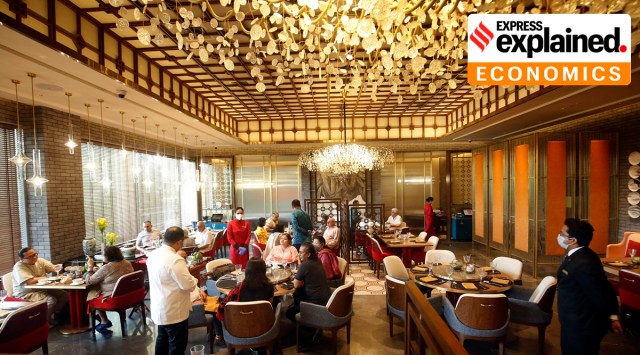The ministry wrote a letter to NRAI – the umbrella restaurant body – saying the restaurants are collecting service charges from consumers by default, even though collection of any such charge is voluntary and at the discretion of consumers and not mandatory as per law.

We break up the restaurant bill to know what is a service charge, and understand if it is voluntary, discretionary or contractual:
Components of a food bill
A restaurant bill in India comprises food charge (from the menu), with an addition of service charge (anywhere between 5 to 15 per cent) and a 5 per cent GST on this amount (IGST+SGST). This is for all kinds of standalone restaurants. In case a restaurant is located inside a hotel wherein room rate is upwards of Rs 7,500 (mostly in case of five-stars), the GST would be 18 per cent. While the GST is a mandatory component as per law, it is the service charge which is supposed to be optional. It is the equivalent of what is known as gratuity around the world, or tip, in casual parlance.
Most restaurants decide the service charge on their own, and print it at the bottom of the menu with an asterisk. It is this component which has come under dispute from time to time, with consumers arguing they are not bound to pay it.
Buy Now | Our best subscription plan now has a special price
The matter
In a statement released on Tuesday, NRAI says that the matter had come up in 2016-17 as well, and they had provided their response to the government. “There is nothing new which has been communicated by the Department in its letter for the meeting on June 2, 2022,” it says. After several complaints of the restaurants making service charge binding on their patrons, the Ministry of Consumer Affairs had come out with “Guidelines on Fair Trade Practices Related to Charging of Service Charge from Consumers by Hotels/ Restaurants”, wherein it was clearly mentioned that “a component of service is inherent in the provision of food and beverages ordered by a customer, and therefore the pricing of the product is expected to cover both the goods and service components”.
Story continues below this ad
It also said that hotels and restaurants charging tips from customers “without their express consent in the name of service charges” amounts to unfair trade practice. It said that the bill “may clearly display that service charge is voluntary, and the service charge column of the bill may be left blank for the customer to fill up before making payment.”
What do the restaurants say?
The levy of service charge by a restaurant is a matter of individual policy to decide if it is to be charged or not. There is no illegality in levying such a charge, says NRAI. “Information regarding the amount of Service Charge is mentioned/displayed by Restaurants on their menu cards and otherwise also displayed on the premises, so that customers are well aware of this charge before availing the services,” it says.
Once the customer is made aware of such a charge in advance and then decides to place the order, it becomes an agreement between the parties, and is not an unfair trade practice. GST is also paid on the said charge to the Government, the association says.
Where does the fund go?
Story continues below this ad
Restaurants claim that a major chunk of the service charge thus collected goes to the staff, while the rest goes towards a welfare fund to help them out during good and bad times. It’s a default billing option, even as customers can choose not to pay it if they don’t want to. Of course, they are paid the salaries but the service charge works as an incentive for them, they insist, adding that still, if someone doesn’t want to pay for it, they can request for it to be removed. Restaurateurs also say that patrons can decide not to pay the charge and tip the server directly, but in this case, the backroom staff doesn’t get anything. A service charge ensures all staff members are rewarded evenly.
What is the issue then?
The issue, as per the Ministry, is that almost all restaurants have put service charge (fixed at their own accord) as a default billing option, and if a consumer is aware that it it not compulsory and wants it removed or wants to tip the server directly, the onus is on them to convince the management why they don’t want to pay it. The department says they received several complaints saying it leads to public embarrassment and spoils the dining experience since at the end of it, they either pay the charge quietly and exit the place feeling cheated, or have to try hard to get it removed. Also, there is no transparency as to where this charge goes. The officials also say that collecting service charge on their own and paying GST on it to the government doesn’t make it authorised.








































